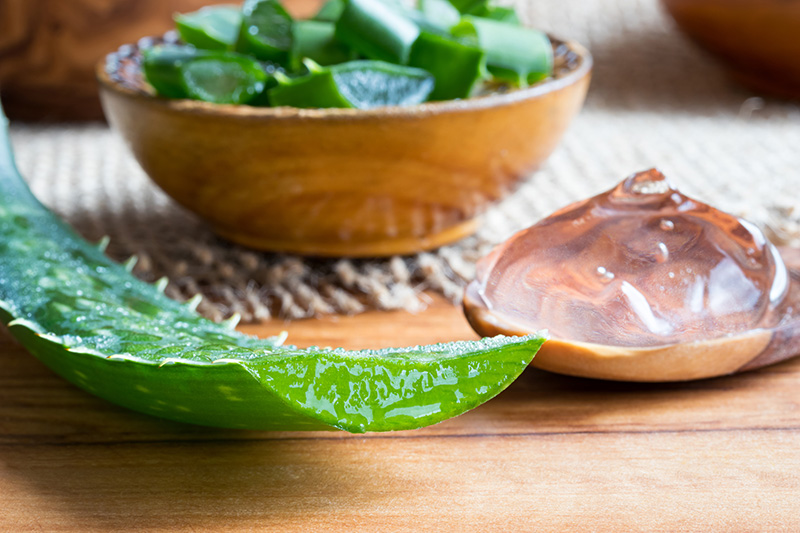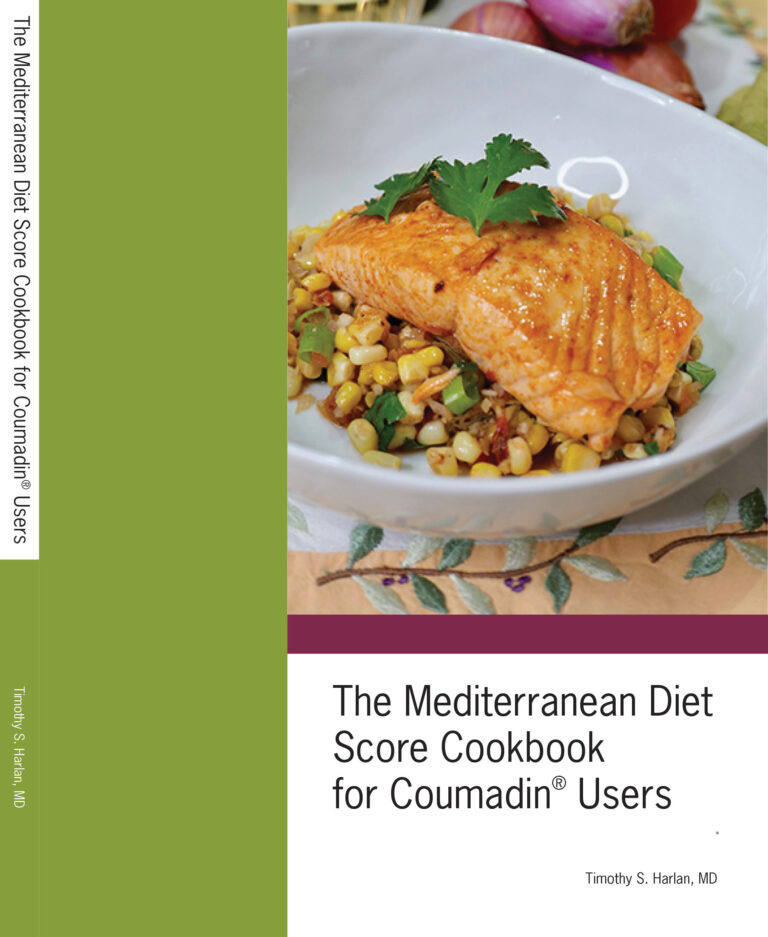It's easy to get answers about health and nutrition! Just send your question by email to [email protected] and Dr. Harlan will respond to selected questions of general interest. Answers will be posted in the Ask Dr. Gourmet newsletter (sign up now!) and archived in the Ask Dr. Gourmet section of the website.
Please note that the Ask Dr. Gourmet feature is restricted to questions regarding food and nutrition. Due to the many questions we receive, not all questions may be answered. For more specific questions about your individual health, please contact your doctor. About Timothy S. Harlan, MD, FACP, CCMS | Terms of Use | Privacy Policy
Get the Coumadin Cookbook!
This indispensable book includes:
• A primer on WHAT a Mediterranean-style diet is and WHY it's great for you
• 95+ delicious Coumadin safe recipes
• Information about managing your diet on Coumadin
• Ingredient and cooking tips throughout the book
• Complete Nutrition Facts, including Vitamin K content, for each recipe
Buy the paperback | Buy the eBook (PDF document)
Questions about ordering? Click here to read the FAQ.
How to order by mail: We are happy to accept personal checks drawn on a US bank for delivery within the United States only. Download the form to order by mail. We regret that we are unable to process orders by phone or ship printed books outside the United States.
Note: This is a revised and updated version of Dr. Harlan's The Dr. Gourmet Diet for Coumadin Users. These are the same recipes with updated Nutrition Information, with the addition of information on a Mediterranean-style diet.
How Much Vitamin K is in...?
Find out the exact amount of Vitamin K (in micrograms) of almost a thousand common foods! Listed both alphabetically and then in order of the amount of Vitamin K in the food, this list will help you know exactly how much Vitamin K you're eating. Just $4.95 for the eBook (PDF) or $12.95 for the paperback. Get your copy now!
Ask Dr. Gourmet
Will drinking aloe vera juice interact with Coumadin (warfarin)?
I am a female patient with a metal mitral valve on Coumadin. Recently I was cardioverted. My cardiologist is suspicious that Raloxifen might have caused the rhythm of my heart to go up. I am a yoga practitioner and was told that the salvia in aloe vera was excellent for postmenopausia, 1 tablespoon taken thrice a day. Might this be the problem?
Dr. Gourmet Says...

There is no good scientific evidence that supports drinking aloe vera juice. I cannot figure out why folks believe that it has such magical benefits as have been described, but no benefit has been proven.
I have not been able to find any reports of it interacting with Coumadin® (warfarin).
A follow-up question from Matt:
Dr Gourmet says that aloe has no good scientific evidence of health benefits.
I've read several scientific studies. I'm wondering why they are no good. Here are a few of them:
Effects of aloe emodin on U87MG glioblastoma cell growth: In vitro and in vivo study
Anti-cancer effects of aloe-emodin: a systematic review
Aloe Polysaccharides Inhibit Influenza A Virus Infection—A Promising Natural Anti-flu Drug
Antiviral activity of an aqueous extract derived from Aloe arborescens Mill. against a broad panel of viruses causing infections of the upper respiratory tract
Candelabra Aloe (Aloe arborescens) in the therapy and prophylaxis of upper respiratory tract infections: traditional use and recent research results
Biologic Effects Of Aloe Vera Gel
Evaluation of biological properties and clinical effectiveness of Aloe vera: A systematic review
Dr. Gourmet Says...
Thanks for writing. I appreciate you calling me out on my claim that no scientific evidence exists for aloe vera providing any proven clinical health benefit. It gives me the opportunity to point out the difference between science and pseudoscience.
The latter is defined by Merriam-Webster as "a system of theories, assumptions and methods erroneously regarded as scientific." Sadly, this is something intelligent people can fall prey to - even many of my physician colleagues. In practice, this means reviewing the literature as you have done and drawing a conclusion that fits the hypothesis rather than considering all of the evidence. We in the science education industry refer to this as "cherry-picking" - that is, citing only the research that validates our theory and ignoring the research that does not.
Cherry-picking in pseudoscience such as that surrounding aloe vera generally falls into one of a few categories.
The first is "journals" that are not peer-reviewed and are really just places for people to "publish" author's "work". These are usually a pay for publication scheme, as is your citation Biologic Effects of Aloe Vera Gel. The "Internet Scientific Publication" is not a journal, not peer reviewed and charges authors both a submission fee and a publication fee (http://ispub.com/submit-an-article). That is not how good science is reported.
While I can't speak to the reputations of the authors of this article, I can speak to the fact that this is one of the poorest examples of scholarship that I have seen - and I will be using it to help medical students understand how our patients can so easily be misled. I can also speak to my belief that one does not pay to get published - that's simply bad scholarship.
Most of the papers cited by the authors of that article are well over 20 years old, the majority are not in peer-reviewed publications, most are animal and not human studies, and one of their citations is the website of a dental practice in Orange County, California (that I cannot find any reference to aloe vera on). A few of the articles that they cite offer no actual conclusion. For example, in their fourth cited article the authors conclude, "Even though there are some promising results, clinical effectiveness of oral or topical aloe vera is not sufficiently defined at present."
The second issue that often fools people is that studies in mice or in the test tube are not conclusive and can offer little or no insight into the clinical effectiveness of a therapy as it might apply to humans.
In algebra, if A = B and B = C, A always = C. That's a mathematical fact.
This is not the case in clinical medicine. In fact, A almost never equals C.
Using mice, rat, or other animal studies and trying to apply those results as if they are clinical proof for using a therapy on humans is not just misguided, it is dangerous. The first five papers you cite are all either in animal models or use cultured tissue, not humans. Amongst all of these citations there are no randomized controlled trials in humans that prove that aloe vera is effective or safe for human consumption.
About those mice. Those of us who either do serious science or follow the outcomes of serious scientists use a hashtag now: #inmice. This means that the conclusion is interesting and may someday lead to a clinical application (although from my reading it seldom does), but for now it is nothing more than an interesting finding in mice (or rats or other animal model).
Sadly, many journalists will use these #inmice findings to create interesting headlines, but they seldom explain that the studies have no relevant application for actual humans at this time.
The third issue is the quality of some of the trials and the substances that are used either as aloe vera or aloe vera extracts. Drilling down into about 10 of the studies cited in the review articles you shared, one finds that the aloe vera preparations vary so widely as to not be able to draw any significant conclusion about the aloe vera product that you might purchase at retail.
Given that the supplement industry in the United States is effectively unregulated, you have no idea what you might or might not be taking if you do purchase "aloe vera".
It is well established that the industry is corrupt. The New York Attorney General filed suit against retailers for such corruption: "New York Attorney General Targets Supplements at Major Retailers" and "GNC, New York reach deal on herbal supplement standards". Unfortunately, this did not put a dent in the industry, and people continue to waste their money on products that have no clinically proven benefit or ones that are not even what they are labeled to be.
Lastly, there are studies that have been done that are interesting, but they are of mixed quality and not anywhere near conclusive. All of them are so small as to be nothing more than just that: simply interesting. Until we have a set of laws that regulates the supplement industry in a reasonable way, this will continue to be the case.
Sadly, there is just no funding to perform quality, large scale studies on substances such as aloe vera (whether in raw, juice, or other preparation). Small scale studies have too often led to an incorrect conclusion that puts people at risk of adverse outcomes.
For example, in the 1990s it was observed that men who had prostate cancer had lower levels of Vitamin E and selenium in their bloodstream. I had many patients coming in who had started taking the combination at random doses (sometimes quite high doses). Fortunately, the NIH mounted a large scale, placebo-controlled trial.
The result? The men taking the Vitamin E and selenium ended up being diagnosed with prostate cancer at a significantly higher rate. They actually discontinued the study early because they were putting participants in harm's way.
Maybe all of that is not enough to convince you: pseudoscience beliefs die hard. However, the best reading of the literature can only come to the rational conclusion that consumption of aloe vera in the belief that it will afford benefit is theory at best but at worst simply magical thinking.
Thanks for writing,
Timothy S. Harlan, MD, FACP, CCMS
Matt's response:
This is not an extensive list of research. Of course it's very difficult to spend millions of dollars on research on something that can't be patented. Sadly people like you will never believe there is something better to heal them besides big pharma.

